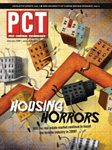Hear more from Fugler: The following is an excerpt from a PCT Podcast with Fugler. Visit www.pctonline.com/podcasts to hear the podcast in its entirety.
Change is in the air at the Florida Pest Management Association. In late November, FPMA President David M. “Mickey” Nolen announced the appointment of Allen Fugler as the association’s new executive vice president, effective Jan. 1, 2008.
Fugler is an experienced association executive, having begun his career in the pest control industry in 1991 as executive director of the Louisiana Pest Control Association (LPCA). He was integral in the growth of LPCA by managing all phases of the not-for-profit, state-wide association including financial planning, educational classes, media relations, publication editing, and regulatory and legislative affairs. Before joining FPMA, Fugler worked for Louisiana Insurance Pest Control Association (LIPCA) since 1997 as the vice president of marketing. With LIPCA, he gained experience in supervising and managing marketing personnel, database development and maintenance and maximizing company revenue.
Fugler’s goal is to guide the educational, regulatory and legislative affairs of the pest control industry as they impact its long-term economic viability and affect public policy and perception. In a recent PCT Podcast, Fugler spoke more in-depth about this goal. Here is an excerpt from that podcast:
PCT: How do you think some of your past experiences with LPCA and LIPCA will help you deal with some of the issues the pest management industry in Florida faces?
Allen Fugler: As past executive director of the Louisiana Pest Control Association I am familiar with the business of association management — financials, meeting arrangements and those types of things. I’m well-accustomed to working with committees, and committees actually drive these types of organizations — especially in the Florida Pest Management Association — giving me direction and goals to meet; working with state regulators on various issues, enacting regulations that fit both the consumer protection and industry advancement goals; working with legislators crafting reasonable laws, playing defense whenever necessary; working with the media on delivering the industry’s message and perfecting its image with the public.
PCT: What are some of the biggest challenges and opportunities for pest management professionals in Florida?
AF: Growing awareness of the far-more educated consumer base. People want to make choices that are economically feasible and environmentally sound. I think that you are going to find that services that PCOs and PMPs deliver to Floridians and tourists/visitors will reflect those changes in consumer attitudes.
PCT: Why is it important for FPMA to work with the other Florida associations, and how important of an objective is it for you to work on these relationships?
AF: It’s very important. All Florida associations share common goals. Their members want to protect the health and property of Floridians, to make sure Florida is an attractive base for visitors and tourists. The tourist base of the Florida economy is paramount. They all want reasonable regulations and a sound working relationship with the regulatory community. They all need a common voice and mission with legislators. A ‘house divided can’t stand,’ of course. They all need to work together to craft those objectives to deliver the message to those that affect the business and the public that they serve. And this can best be obtained by cooperation and open communication.
PCT: How would you like to see FPMA expand its mission and objectives?
AF: I think one particular opportunity FPMA is seizing on is the growing green industry. A lot of pest management professionals in Florida have moved over to servicing not only the interior of the home and immediate exterior of the home from household and wood-destroying insects, but to look at the house in its totality — curb appeal if you will. To make sure the lawn is as green as the profits they make. As I mentioned earlier you have emerging consumer attitudes towards environmentally sound and friendly technology and products. I think we need to support emerging consumer trends, and support continued research and continued efforts in mission-crafting to deliver to those consumers we serve.

Explore the January 2008 Issue
Check out more from this issue and find you next story to read.
Latest from Pest Control Technology
- Orkin Helps Local Youth Sports Program Design a ‘Killah’ New Logo
- ABC Home & Commercial Services Celebrates 75 Years in Business
- NPMA Academy Announces Full Schedule
- Truly Nolen Promotes Marchello, Christopherson and Bolton to Managerial Positions
- TruGreen Announces 2024 List of Top 20 U.S. Buggiest Cities
- Why PMPs Use Rodent Bait Stations
- NPMA’s Women’s Forum Encouraged Female Leadership, Growth Opportunities in Pest Control
- GoPest Expands to Birmingham and Huntsville (Ala.)





